News
The man regarded as the father of the $3 billion California stem cell agency is thinking about changes in the program to help win voter approval of another $5 billion for the research program. They include a stronger requirement to make state-backed, stem cell therapies more affordable and accessible and to provide more cash for creating a greater stem cell work force in the Golden State.
Opinion
OPINION: California Community colleges do an outstanding job offering degree attainment and education opportunities that lead to rewarding careers for the 2.1 million students who attend. But far too many of those students cannot cover enrollment fees and basic living expenses, putting them at risk. The current financial aid formula does not fully address the needs of students working to meet their academic goals, and in many cases, working full-time to support themselves and their families.
News
One of Gov. Gavin Newsom’s first actions after taking office was to appoint Wade Crowfoot as Natural Resources Agency secretary. Then, within weeks, the governor laid out an ambitious water agenda that Crowfoot, 45, is now charged with executing. That agenda includes the governor’s desire for a “fresh approach” on water, scaling back the conveyance plan in the Sacramento-San Joaquin Delta and calling for more water recycling, expanded floodplains in the Central Valley and more groundwater recharge.
Opinion
OPINION: The California Consumer Privacy Act (CCPA), which takes effect next January, was intended to protect the privacy of personal consumer information by limiting the sale of information between organizations that use data to reach customers, and it provided consumers with certain rights. To achieve these consumer-focused goals, the CCPA imposes significant requirements and burdens on businesses.
Opinion
OPINION: The high costs of prescription drugs have rightly prompted concern from Californians and lawmakers looking for ways to bring down costs. Recently, both California and the federal government have taken positive steps to address this concern by increasing transparency. Still, more action is needed to reduce costs to consumers at the prescription counter.
Opinion
OPINION: Thanks to Assembly Bill 33, introduced by State Assemblyman Rob Bonta, the California State Legislature will spend time and resources to codify an issue that California pensioners have spoken on before: divesting from high-performing funds for political purposes.AB 33, as written, would require that state retirement systems, namely California Public Employees Retirement System (CalPERS) and the California State Teachers’ Retirement System (CalSTRS), divest of all investments in private corrections companies and disallow investing in those same companies in the future.
News
Most of us are already doing a lot of business online, from ordering products to banking to even filing our taxes. Now we will be asked to do one more task over the Internet — fill out a U.S. census survey. The next census, the all-important survey conducted every 10 years and next scheduled in April 2020, will be the first to be conducted largely online. People who choose not to will be able to respond over the phone or by mail.
News
One was a charter school operator desperate for authorization after years of rejection by multiple school districts. The other was a teeny district in the rural high desert, hemorrhaging students, facing insolvency and in dire need of revenue.
Opinion
OPINION: In much of the country a powerful energy boom is providing a serious stimulus to economic growth. But in California, where fossil fuels are considered about as toxic as tobacco, we are lurching toward an anticipated energy shortage that will further exacerbate the state’s already deep geographic and class divisions.
News
It’s pretty much all there: money, celebrity, scandal, more money, cheating, coaches being bribed — advantage layered over advantage. In what federal law enforcement officials say is the “largest college admissions scam ever prosecuted by the Department of Justice,” federal prosecutors have accused dozens of wealthy parents of making at least $25 million in illegal payments in one form or another to get their unqualified children into select colleges.










